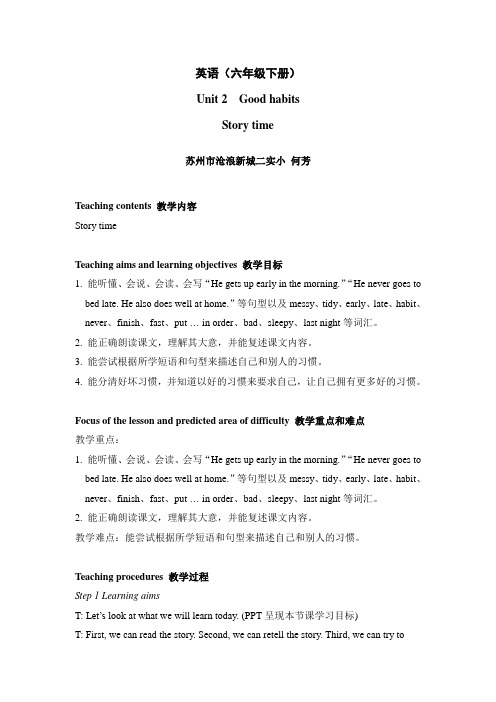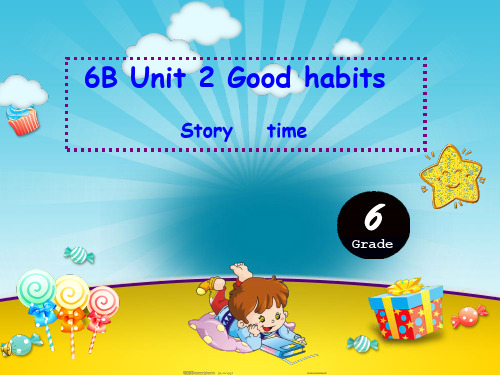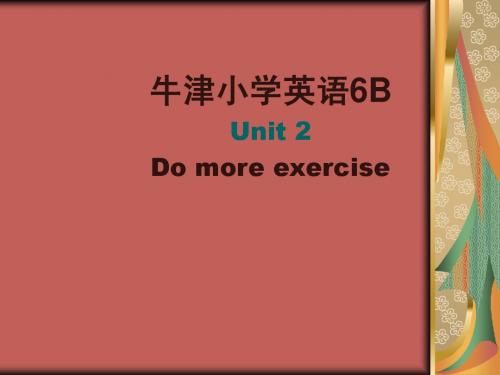6B Unit 2
六年级英语下册 6B unit2(1)课件 苏教牛津版

I am not good at / do well in … But I … I want to do better, so I’ll …
跟读
Dad, I’m not happy.
What’s the matter? ur homework?
No, I’m not doing well in PE. Ben runs faster than me. He’s strong. Mike runs as fast as Ben, and he’s a good football player, too.
谈论topic 123
1 你在体育方面有哪些长处?
2 你在体育方面有哪些做得不够好?
3 怎样可以做地更好?
But I think you jump very high.
跟读
(的确如此) That’s true. I jump higher than some of the boys in my class.
And you can swim fast.
Yes, but my friends swim faster than me.
Don’t worry. Do more exercise. You’ll get stronger, and you’ll do better in PE.
Yes, Dad. I’ll get up earlier everyday and do some exercise before I go to school.
Read and compare 读一读,比一比
run fast
run faster (跑得更快)
jump high jump higher (跳得更高)
牛津苏教版-英语-六下--6B Unit2 More exercise全课时教案

Unit 2 More exercise教材分析:本单元引入了副词比较级。
话题围绕着Jim和他爸爸谈论如何进行体育锻炼展开。
建议教师在学习本单元之前先了解以下本班学生的身体情况及体育成绩,如谁跑得比较快,谁跳得比较高,以便在讨论话题是让学生产生认同感和亲切感。
课前教师可设计一个学生自己制定锻炼身体的计划的任务,使学生把所学的语言只是与生活实际联系起来。
本单元有些副词的比较意义较为抽象,如late, later, early, earlier, well, better. 建议教师在教学中尽可能用具体的手段帮助学生理解这一难点。
学情分析:本单元在上单元学习的形容词的比较级的基础上,又学习了副词的比较级。
有些副词的比较意义较为抽象,不利于学生的理解掌握。
在教学时,教师可以采用一些教学手段来帮助学生理解这一难点。
如,情境创设教学法、对比教学法等。
单元教学目标:1.能听懂、会说、会读和会拼写单词和词组more, low, slow, far, be good at2.能听懂、会说和会读单词和词组player, true, number, ball game.3.能听懂、会说和会读日常交际用语That’s true. Well done. Mike runs as fast as Ben.4.能听懂、会说、会读、会写句型 Ben runs faster than Jim. Do the boys jump higher than the girls? Does Jim swim slower than David?5.了解字母组合or在单词中的读音。
6.会诵读歌谣Run, rabbit, run!课时安排:第一课时:学习B、C部分内容第二课时:学习B、C、D部分内容第三课时:学习A部分内容第四课时:学习E部分内容第五课时:学习F、G、H部分内容。
译林版六年级英语下册6B Unit2 Good habits重点短语句子

Unit2 Good habits一、单词1. habit习惯2. messy乱的3. never从不4.finish完成5. tidy整齐的6. sleepy 困的7. order顺序8. review复习9. horse马10. early早地11. late晚地12. fast快地13. slowly慢地14. badly糟糕地15. beautifully漂亮地二、词组1. good habits 好的习惯2. brush one’s teeth 刷牙3. listen to his teacher 听他老师说4. do well at home在家做得好5. clean and tidy干净又整齐6. help his parents 帮助他的父母7. finish his homework late 作业完成得晚8. feel sleepy 感到困9. last night 昨晚10. know him well 很了解他11. walk fast=walk quickly走地快12. four short horses 四匹矮马13. run through the grass 跑着穿过草地14. come to see 来看15. show sb. around 带某人参观16. go into 进入17. keep … in order 管理地井井有条18. on time 准时19. good learning habits 好的学习习惯20. look tired看起来累21. be good/bad for 有利于/ 对...有害22. in a mess一团糟23. wash one’s face洗脸24. never go to bed late从不晚睡觉25 before bedtime 睡觉前26. put … in order把...放的井井有条三、句子1.He gets up early in the morning and never goes to bed late.他早上起床早,从来不晚睡。
6Bunit2 good habits 第1课时(Story time)教案

英语(六年级下册)Unit 2 Good habitsStory time苏州市沧浪新城二实小何芳Teaching contents 教学内容Story timeTeaching aims and learning objectives 教学目标1. 能听懂、会说、会读、会写“He gets up early in the morning.”“He never goes to bed late. He also does well at home.”等句型以及messy、tidy、early、late、habit、never、finish、fast、put … in order、bad、sleepy、last night等词汇。
2. 能正确朗读课文,理解其大意,并能复述课文内容。
3. 能尝试根据所学短语和句型来描述自己和别人的习惯。
4. 能分清好坏习惯,并知道以好的习惯来要求自己,让自己拥有更多好的习惯。
Focus of the lesson and predicted area of difficulty 教学重点和难点教学重点:1. 能听懂、会说、会读、会写“He gets up early in the morning.”“He never goes to bed late. He also does well at home.”等句型以及messy、tidy、early、late、habit、never、finish、fast、put … in order、bad、sleepy、last night等词汇。
2. 能正确朗读课文,理解其大意,并能复述课文内容。
教学难点:能尝试根据所学短语和句型来描述自己和别人的习惯。
Teaching procedures 教学过程Step 1 Learning aimsT: Let’s look at what we will learn today. (PPT呈现本节课学习目标)T: First, we can read the story. Second, we can retell the story. Third, we can try totalk about the good habits.【设计意图:让学生对本节课的教学内容有所了解。
新译林牛津英语6B unit 2-1 story

I often put my things in order. 把…放整齐
1.What habits do Wang Bing and Liu Tao have?
我们先读一读选项! a b c d does his homework late at night gets up early goes to bed late helps his parents
-12-10-
You shouldn’t go to bed late,LiuTao.
-11-13-
1.What habits do Wang Bing and Liu Tao have?
Did you go to bed late last night, Liu Tao? Ouch!
Yes, but I’m not sleepy. I can walk fast.
morning.
a. does his homework late at night c. goes to bed late d. helps his parents listens to his teachers at school keeps his room clean and tidy
2、在组内汇报自 己划的答案! Z z
1....gets up…
2. He brushes his teeth…
1.... listens to …
2. He keeps his room…
3. He helps…
3. he always puts...
4. He finishes...
4. He often does ... 5. He sometimes feels...
牛津小学英语6B_Unit2_Do_more_exercise(Part_FGH)

1.Who flies the kite higher , the boy or the girl ? 2.Who runs faster , the boy or the girl ? 3.Who swims faster , Grandma or Grandpa ? 4.Who skates better , the boy or the girl ? 5.Who sings better , the boy or the girl ? 6.Who goes to bed later , the boy or the girl ? 7.Who jumps higher , the boy or the girl ?
1.Who flies the kite higher , the boy or the girl ? 2.Who runs faster , the boy or the girl ? 3.Who swims faster , Grandma or Grandpa ? 4.Who skates better , the boy or the girl ? 5.Who sings better , the boy or the girl ? 6.Who goes to bed later , the boy or the girl ?
1.A部分听读三遍,背诵课文第三段。 2.预习Unit3。 3.完成联练习与测试。
牛津小学英语6B
Unit 2 Do more exercise
good memory
好记性
better memory
remember
记住、记得
Let’s play a game
Who flies the kite higher, the boy or the girl? The girl flies the kite higher.
6BUnit2教案
run slower than other boys, not a good football player
should do
get up earlier, do some exercise before go to school,
jog to school, play ball games after school
play ball games after school
Step 2Listen and write
3.能听懂、会说主要句型Ben runs faster than Jim.
4.初步了解掌握副词比较级的构成及用法。
5.理解A的意思,能通读课文并能根据板书复述课文。
重难点
1.理解A的意思,能通读课文并能根据板书复述课文。
2.初步了解掌握副词比较级的构成及用法。
课前预习(准备)要求
翻译词组:
跳得高跑得快起床迟跳舞好飞得高
教学过程
Step 1 Revision
1. Free talk.
T: Good morning, boys and girls.
T: What day is it today?
T: Are you as tall as xxx??
T: Who is taller, you or Tom?
T: Who is younger, you or Su Yang?
T:Do the boysjump higher than the girls?
S: Yes, they do. /No, they don’t.
2.一男一女上黑板跳摸高
T: Does the boy jump higher than the girl?
小学英语 6B Unit2《More exercise》
小学英语 6B Unit2《More exercise》江苏省兴化市新生中心小学王婷婷邮编:225700一、教案背景:1.面向学生:√小学2.学科:英语2.课时:13.学生课前准备:1)、听录音,预习本课单词;预习课文,了解课文大意。
2)、复习以前学过的比较级。
二、教学课题:牛津小学英语6B Unit2《More exercise》Part A1.能听、说、读、写单词和词组more, be good at.2.能听、说、读单词和词组jog, do well in, need help with, do more exercise, player, true, ball games.3.能听、说、读、写句型Ben runs faster than Jim.4.能听、说、读日常交际用语That’s true. Mike runs as fast as Ben.5.能正确理解A部分对话内容,并能熟练朗读。
三、教材分析:从本单元的课题“More exercise”来看教材内容主要是围绕如何进行体育锻炼而展开的话题,是继第一单元出现的形容词比较级的进一步学习。
通过课文重点语言知识点的学习,进一步提高学生听、说、读、写综合语言运用能力。
四、教学方法:本课是牛津小学英语6B Unit2 More exercise 的第二教时。
第一课时中已经完成了对主要句型及副词比较级的学习。
本课的主要任务是完成课文教学,课文中涉及到了be good at, do well in, need help with, some of the boys, do more exercise, jog to school等知识点。
《英语课程标准》提倡以人为本,遵循“为用而学,在用中学,学了就用。
”设计本课时,从学生的实际出发,逐个解决各个知识点,通过师生间的问答、操练,把难点分散在各个环节中,不漏痕迹地完成了重难点的处理,为学生理解课文打好了基础。
牛津英语六年下册第二单元知识点归纳与整理
第二单元知识点归纳与整理6B unit2善于:be good at (be 要根据前面的人称和时态进行相应的变化)在某方面做的好:do well in ( do 也是要根据前面人称和时态进行相应的变化)告诉某人关于某事:talk to somebody(sb.) about something (sth.)( about: 关于,somebody 的缩写为sb., something 的缩写为sth.)某人怎么了/某人有什么问题吗?:What’s the matter with somebody ? = what’s wrong with somebody? (the matter 可以换成wrong, 人物的前面一定是with )在我班级里的一些男孩:some of the boys in my class ( some of the boys , some 在这里是名词,后面跟of的时候,一定在名词前面要加the , 例如:some of the teachers , some of the workers )在某方面需要帮助:need help with …..( 请注意这里的with , 在某个方面需要帮助)足球运动员:football player (记住这里的player 是运动员的意思,依次类推,其他球类的运动员都可以用球类名称+player )那是真的。
/那是事实:That’s true.不要担心:Don’t worry.多做些运动:do more exercise做些运动:do some exercise上学/去学校:go to school ( 回家:go home)那是个好主意:Tha t’s a good idea.慢跑:jog在早上:in the morning (请注意:这里需要用的词是in, in的后面一定要加个the, 在下午/晚上— in the afternoon/evening, 没有说明是具体哪天,就用in , 但是,如果有说明具体的哪天,就不用in, 而要用on, 在3月29日早上:on March 29 morning….)放学后:after school男孩子们比女孩子们跳得高吗?:Do the boys jump higher than the girls?大卫游泳比吉姆慢吗?:Does David swim slower than Jim?参观/游览某地:visit + 地点(参观动物园:visit the zoo)迟到:be late (你迟到了:You’re late. He’s late. We’re late.)不要迟到:Don’t be late. (这个句子是祈使句,就是给出指示或命令的句子,一般句子不用主语)我们(做什么事)好吗:Shall we …..?(shall we + 动词原形,我们开始,好吗?--- Shall we start? , 我们看电视,好吗?--- Shall we watch TV? )想,想要:would like ( would like + 名词或would like + to + 动词原形I would like a new car./ I would like to buy a new car. )我们全部:all of us请你/你们….好吗?:Would you …. please? ( would you + 动词原形,Would you leave, please? )你错了:You are wrong.干得好!:Well done!forty, horse, morning, sports [ɔ:]good/well—better, bad/ill – worse, far – farther, little/few – less, old—older, elder many/much—more。
人教PEP版-英语-六年级下册--6B Unit2佳作欣赏 I like Zhongshan Park
I often go to Zhongshan Park. In the park you can see many trees and flowers. Some flowers are red, and some are purple. The trees are big and tall. You can see a hill in the park, too. At the foot of the hill, there are several① paths.
A lot of people in my city like going to the park. Some young people like taking a walk there. Some old people like singing there. Some children like dancing or playing games there.
Zhongshan park is really a good place for relaxation②.
生单词:
1. several:几个
2. relaxation:放松
点评:陈祖新小朋友的这篇作文简单明了。
首先,作者向大家简单地描绘出了公园的风景:有山有水有花。
然后,作者写了人们在公园里的活动:青年人在公园里散步,老年人在公园里唱歌,小孩子在公园里玩游戏,多么快乐的一组画面啊!最后,作者作出总结:中山公园真的是一个放松心情的好地方!
人教PEP版-英语-打印版。
- 1、下载文档前请自行甄别文档内容的完整性,平台不提供额外的编辑、内容补充、找答案等附加服务。
- 2、"仅部分预览"的文档,不可在线预览部分如存在完整性等问题,可反馈申请退款(可完整预览的文档不适用该条件!)。
- 3、如文档侵犯您的权益,请联系客服反馈,我们会尽快为您处理(人工客服工作时间:9:00-18:30)。
6B Unit 2 I. Word formation (词性转换) 1. flight (n.) fly ( v. ) 2. departure (n. ) opp. arrival ( adj. ) 3. worry ( v. ) worry (n. ) worried ( adj. ) 4.arrival (n.) arrive (v.)
II. Useful expressions (核心词组) 1. at the airport 2. plan to do sth. 3. a silk scarf / several silk scarves 4. let me drive you to the airport 5. arrival time 6. deparutre time 7. buy sb. sth./ buy sth for sb. 8. arrive at the airport 9. Don’t worry. 10. put a name tag on the suitcase 11. write down Aunt Judy’s address
III. Language focus (重点句型) 1. Have you … yet? Yes, I’ve already… No, I haven’t … yet 2. leave for 3. have to
IV. More readings(补充阅读) 能读懂与课文长度相当的关于旅行的文章 V. Topics Say something about your holiday plan. Where are your going this coming holiday? How are you going there? Why do you want to go there for a holiday? 6B Unit 2 Paper A I. Fill the blanks with the proper words according to the given phonetic symbols. 1. Grandma has bought Aunt Judy plenty of T-shirts and ___________ / ˈsevrəl /silk scarves. 2. ____________ / haʊˈevə / they haven’t packed their suitcases yet. 3. All ____________/ ˈpæsindʒəz / must arrive at the airport two hours before the departure time. 4. Your / flaɪt / __________ Number is MU586. 5. Have you written Aunt Judy’s ____________/ ə'dres /? 6. We have already got some US____________ˈ/ dɔləz / 7. Write a ____________/ˈtʃeklɪst /for her. 8. Where can we find a __________/ 'trɒlɪ/ ?
Ⅱ Translate the following phrases 1.洛杉矶之旅________________ 2.起飞前两小时__________________ 3.让我带你去机场___________________ 4.去另一个国家_______________ 5.不得不待在那里 ___________________ 6. 到达时间 _________________ 7.足够的空间___________________ 8.几条丝巾 __________________ 9.在那里看见许多标志___________________ 10.带一个相机 ___________________ 11.拿些美元 __________________ 12.整理行李箱__________________ 13.写下朱迪阿姨的地址__________________ 14.打电话给他叔叔 __________________ 15.出差___________________ 16.把姓名牌贴在行李箱上 __________________
Ⅲ. Translate the following sentences. 1. 王夫人和奶奶计划这个周日去洛杉矶看望朱迪阿姨和迈克叔叔。 __________________________________________________________________________ 2. 我的箱子里有足够的空间放你的衣服和丝巾。 __________________________________________________________________________ 3. 他们以前没去过日本。 IV.Rewrite the sentences as required. 1. They have already packed their suitcases. (改为否定句) They __________ packed their suitcases__________. 2. We have already brought our passports. (改为一般疑问句) __________ you brought your passports__________? 3. Have you got your boarding cards? (否定回答) __________.,__________ __________. 4. Have you put a name tag on your suitcase? (肯定回答) __________.,__________ __________. 6B unit 2 Paper B I. Choose the correct words or phrases to complete the sentences. 1. __________ ( Flight / Fly ) Number CA3939 is now boarding. 2. Do you know the __________ (enter / entrance ) of the cinema? 3. When are we going to __________ (arrive / arrival ) in Hongkong? 4. Is there enough _________ (space / places ) in your suitcase? 5. Our high speed train to Xiamen __________ (leaves for / leaves ) at 10:00 a.m. tomorrow. II. Choose the best answer. 1. It’s only five minutes’ walk _________ our school to the nearest underground station. A. at B. in C. to D. from 2. __________ do you visit your grandparents? A. How long B. How often C. How far D. How soon 3. Let Mr. Wang ______ you to the airport tomorrow. A. drives B. driving C. drive D. will drive 4. We plan _______ in Tokyo for three days. A. to live B. to stay C. live D. stay 5. He has eaten _________ hamburgers, so he is full now. A. too much B. so little C. too many D. so few 6. Young children __________ do much homework every day. A. don’t have to B. haven’t C. doesn’t have to D. not have to 7. These suitcases are too heavy. Where can I __________? A. bring a camera B. get some money C. find a policeman D. get a trolley 8. We ______ in this school for almost a year. We really enjoy the life here. A. studied B. study C. have studied D. will study 9. Which sign can’t you find at an airport? A. No babies B. shops C. toilets D. escalators 10. It takes me about half an hour ___________ my English homework every evening. A. to make B. to collect C. to do D. to listen to
